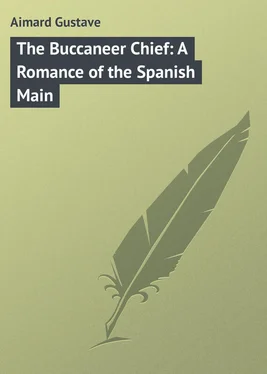Gustave Aimard - The Buccaneer Chief - A Romance of the Spanish Main
Здесь есть возможность читать онлайн «Gustave Aimard - The Buccaneer Chief - A Romance of the Spanish Main» — ознакомительный отрывок электронной книги совершенно бесплатно, а после прочтения отрывка купить полную версию. В некоторых случаях можно слушать аудио, скачать через торрент в формате fb2 и присутствует краткое содержание. Жанр: foreign_prose, на английском языке. Описание произведения, (предисловие) а так же отзывы посетителей доступны на портале библиотеки ЛибКат.
- Название:The Buccaneer Chief: A Romance of the Spanish Main
- Автор:
- Жанр:
- Год:неизвестен
- ISBN:нет данных
- Рейтинг книги:4 / 5. Голосов: 1
-
Избранное:Добавить в избранное
- Отзывы:
-
Ваша оценка:
- 80
- 1
- 2
- 3
- 4
- 5
The Buccaneer Chief: A Romance of the Spanish Main: краткое содержание, описание и аннотация
Предлагаем к чтению аннотацию, описание, краткое содержание или предисловие (зависит от того, что написал сам автор книги «The Buccaneer Chief: A Romance of the Spanish Main»). Если вы не нашли необходимую информацию о книге — напишите в комментариях, мы постараемся отыскать её.
The Buccaneer Chief: A Romance of the Spanish Main — читать онлайн ознакомительный отрывок
Ниже представлен текст книги, разбитый по страницам. Система сохранения места последней прочитанной страницы, позволяет с удобством читать онлайн бесплатно книгу «The Buccaneer Chief: A Romance of the Spanish Main», без необходимости каждый раз заново искать на чём Вы остановились. Поставьте закладку, и сможете в любой момент перейти на страницу, на которой закончили чтение.
Интервал:
Закладка:
The two sailors anxiously examined the surgeon's impassive face, trying to read in his features what they had to hope or fear.
The latter uttered a deep sigh of relief, passed his hand over his damp forehead, and turning to Michael, said —
"Heaven be praised! He sheds tears – he is saved."
"Heaven be praised!" the sailors repeated, crossing themselves devoutly.
"Do you think he is mad, Major?" Michael asked, in a trembling voice.
"No, it is not madness, but delirium; he will soon fall asleep – do not leave him; when he awakes he will remember nothing. If he ask for drink give him the potion I have prepared, and which is on that table."
"Yes, Major."
"Now I am going to retire; if any unforeseen accident occur, warn me at once; but, in any case, I shall look in again tonight."
The surgeon left the cabin; his previsions were soon realised, M. de Barmont gradually fell into a calm and peaceful sleep.
The two sailors stood motionless by his bedside; no nurse could have watched a patient with greater care and more delicate attention than did these two men, whose exterior seemed so hard, but whose hearts were really so kind.
The whole night passed away thus; the surgeon had come in several times, but after a few minutes' examination he withdrew with an air of satisfaction, and laying a finger on his lips.
About morning, at the first sunbeam that entered the cabin, the Count made a slight movement, opened his eyes, and slightly turned his head.
"My good Michael, give me some drink," he said, in a feeble voice.
The sailor handed him a glass.
"I feel crushed," he muttered; "have I been ill?"
"Yes, a little," the sailor replied; "but now it is all over, thank heaven! You need only have patience."
"I feel the motion of the frigate – are we under weigh?"
"Yes, Commandant."
"And who gave the orders?"
"Yourself, last night."
"Ah!" he remarked, as he handed back the glass. His head fell heavily on the pillow again, and he was silent.
Still, he did not sleep; his eyes were opened, and gazed anxiously all around.
"I remember," he murmured, while two tears welled in his eyes; then he suddenly addressed Michael.
"It was you who picked me up and brought me aboard?"
"Yes, Captain, 'twas."
"Thanks! and yet it would have perhaps been better to leave me to die."
The sailor shrugged his shoulders disdainfully.
"That is a fine idea, strike me!" he grumbled.
"Oh, if you only knew," he said, sorrowfully.
"I knew all; did I not warn you of it the first day?"
"That is true; I ought to have believed you – but, alas! I already loved her."
"Zounds! I knew that, and she deserved it."
"Does she still love me?"
"Who can doubt it, poor dear creature?"
"You are a good man, Michael."
"I am just."
There was another silence.
At the expiration of a few minutes the Count renewed the conversation.
"Did you find the letter?" he asked. "Where is it?"
"Here," he said, as he handed it to him.
The Count eagerly clutched it.
"Have you read it?" he asked.
"For what purpose?" said Michael. "Zounds, it must be a tissue of lies and infamies! And I am not curious about reading such things."
"There, take it," said the Count.
"To tear it up?"
"No, to read it."
"What's the good?"
"You must know the contents of the letter – I order it."
"That is different – give it here."
He took the letter, opened, and ran through it.
"Read it aloud," said the Count.
"That is a pretty job you give me, Commandant. Still, as you wish it, I must obey you."
"I implore you, Michael."
"Enough, Captain."
And he began reading the strange missive aloud.
It was short and laconic, but on that very account it necessarily produced a more terrible effect, because every word was carefully chosen to go straight home.
The following was its tenor: —
MY LORD,
You have not married my daughter: I defrauded you by a false marriage. You shall never see her again – she is dead to you. For many years there has been an implacable hatred between your family and mine. I should not have gone to seek you, but Heaven itself brought you in my way. I understood that it was desired I should avenge myself, and I obeyed. I believe that I have succeeded in breaking your heart forever. The love you have for my daughter is sincere and deep. All the better, for you will suffer the more cruelly. Farewell, my lord. Believe me, you had better not try to find me, for, if you succeed, my vengeance will be even more terrible. My daughter will marry in a month the man she loves, and whom alone she has ever loved.
"Don Estevan de Sylva, Duc de Peñaflor."
When the sailor had finished reading he turned an enquiring glance to his chief. The latter shook his head several times, but made no other reply.
Michael handed back the letter, which the Captain at once concealed beneath his pillow.
"What do you intend to do?" the sailor asked him, a moment after.
"You shall know hereafter," the Count answered, in a hollow voice. "I could not form a determination now, for my head is still heavy, and I require to reflect."
Michael gave a nod of assent.
At this moment the doctor came in. He appeared delighted at seeing his patient in so good a state, and with a joyous rubbing of his hands, promised that he should leave his bed in a week at the latest.
In fact, the surgeon was not mistaken, for the Count rapidly recovered; ere long he was able to rise, and at the end of a few days, were it not for a cadaverous pallor spread over his face, and which he ever retained, his strength seemed to have entirely come back to him.
M. de Barmont steered his frigate up the Tagus, and anchored before Lisbon. So soon as the vessel was moored the Captain summoned the second in command to his cabin, and had a long conversation with him, after which he went ashore with Michael and Bowline.
The frigate remained under the command of the first lieutenant: the Count had abandoned it for ever.
This deed almost constituted a desertion; but M. de Barmont was resolved on returning to Cadiz at all hazards.
During the few days that had elapsed since his conference with Michael, the Count had reflected, as he promised the sailor.
The result of his reflections was, that Doña Clara had been deceived by the Duke like himself, and believed herself really married – indeed, the whole of the young lady's behaviour to him proved the fact. In desiring to insure his vengeance too thoroughly, the Duke had gone beyond his object: Doña Clara loved him, he felt certain of that. She had only obeyed her father under the constraint of force.
This admitted, only one thing was left the Count to do; to return to Cadiz, collect information, find the Duke, and have a solemn explanation with him in his daughter's presence.
This plan drawn up in his mind, the young man immediately set, about carrying it out, leaving the command of his vessel to the lieutenant, at the risk of destroying his career and being pursued as a traitor, as the war was raging between France and Spain. He freighted a coaster; and, followed by his two sailors, to whom he had frankly explained his intention, but who would not leave him, he returned to Cadiz.
Thanks to the thorough knowledge of Spanish he possessed, the Count did not arouse any suspicions in that city, where it was easy for him to obtain the information he desired.
The Duke had really set out for Madrid. The Count at once proceeded to that city. A gentleman of the importance of the Duc de Peñaflor, a grandee of Spain of the first class, a caballero cubierto , could not travel without leaving traces, especially when nothing led him to suspect that he was followed. Hence the Count had not the slightest difficulty in discovering the route he had taken, and he arrived at Madrid, persuaded that he should soon have with the Duke the explanation he so ardently desired.
Читать дальшеИнтервал:
Закладка:
Похожие книги на «The Buccaneer Chief: A Romance of the Spanish Main»
Представляем Вашему вниманию похожие книги на «The Buccaneer Chief: A Romance of the Spanish Main» списком для выбора. Мы отобрали схожую по названию и смыслу литературу в надежде предоставить читателям больше вариантов отыскать новые, интересные, ещё непрочитанные произведения.
Обсуждение, отзывы о книге «The Buccaneer Chief: A Romance of the Spanish Main» и просто собственные мнения читателей. Оставьте ваши комментарии, напишите, что Вы думаете о произведении, его смысле или главных героях. Укажите что конкретно понравилось, а что нет, и почему Вы так считаете.












